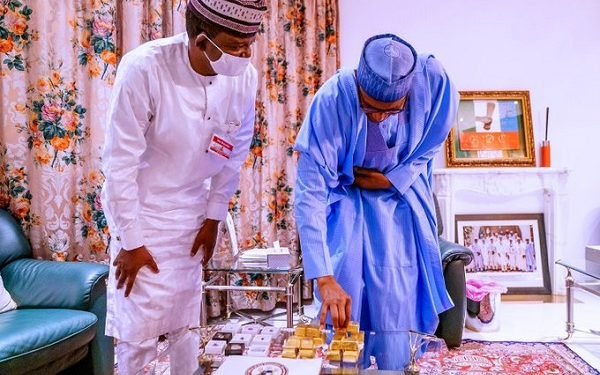
The report that Zamfara State has offered to the Central Bank of Nigeria (CBN), gold bars worth N5 billion raised eyebrows on the sanctity of the provisions of the law that all minerals in the country belong to the Federal Government. While the potential is cheering news for those concerned about the economic viability of states, those from the Niger Delta, whose oil minerals have been exclusively exploited by the Federal Government since 1966, are wondering whether there are two sets of laws, on the ownership of minerals in the country.
Speaking at a Senate plenary, the Deputy Senate President, Ovie Omo-Agege, representing Delta State Central Senatorial District, asked the Senate President a rhetorical question: “Mr President (of the Senate), not too long ago, we saw the Governor of Zamfara State (Bello Matawalle) come before the CBN to present a gold bar worth close to about N5 billion. The gold bar was presented for sale to the CBN. Mr. President, our people are beginning to wonder who owns this gold that is being sold to the CBN.”
There is no report the Senate president answered the question, considering the tension associated with resource control. Nevertheless, various groups in the Niger Delta have raised the haunting poser for the country. Nubri Saatah of the Niger Delta Congress, wrote: ”The President has succeeded in granting states in Northern Nigeria such as his home state of Kastina, Zamfara, and Kaduna, as well as the Southwest state of Osun resource ownership, while deftly neglecting to alter the extractive laws surrounding the Niger Delta where oil is mined and not gold.”
Considering the genuine concerns about the double standard in dealing with the artisanal miners as against the artisanal refiners, the presidential initiative which is driving the new approach in gold mining in the north should be extended to the oil mineral mining in the Niger Delta. As stated by one Dr Vincent Nwani, “If those mining gold illegally in the North can be given such privileges, those refining fuel in the Niger Delta should also be given same,”
To treat states equally, the Presidential Artisanal Gold Mining Development Initiative (PAGMDI), should be replicated in other mining sectors, considering the benefits. As noted by President Muhammadu Buhari: ‘‘with the implementation of the PAGMDI scheme which will result in the set-up of accredited gold buying centres across key mining areas, artisanal miners and SMEs engaged in mining will be able to capture the value of their work.” He also observed that the programme could generate over $500 million annually, and as much as 250,000 jobs.
The unfolding tragedy, arising from the #EndSARS protest, shows that one of the root causes of the crises bedevilling our country is unemployment, and we believe the presidential initiative on gold mining will help to address it. With over 44 mineral deposits scattered across the country, especially in the north, the country and the respective states would earn huge sums of foreign exchange from the exploitation of those minerals. What had held the nation down was her over-dependence on oil, thereby neglecting the other sources of revenue.
Now that the PAGMDI has been established, it is time to amend the relevant laws, including the constitutional provision on exclusive legislative list, which have trapped states in debilitating economic penury. States should be allowed to explore the resources within their domain, and pay taxes to the Federal Government. That will answer the Deputy Senate President’s observation that: “They don’t sell oil in any of the Niger Delta states. I am wondering why a governor of a state should be selling gold bar from Zamfara to the CBN.”
The Zamfara State government is clutching at straws to convince Nigerians it is not subverting federal and constitutional principles. If we follow their logic, the oil states can start buying and selling their oil and turn the exclusive list into a charade.
END

Be the first to comment